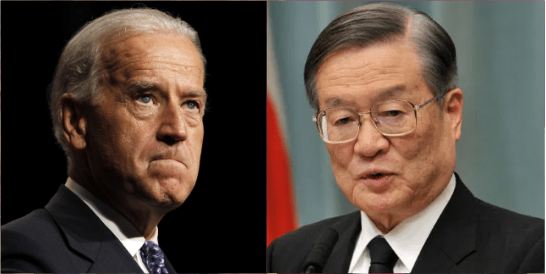A month before Biden was sworn in as President, Japanese defence officials concerned over Biden’s ambiguous policy on Taiwan, had asked, ‘What is your status on Taiwan?’. Now, with Biden in office, concerns have been raised about Biden’s policy on the Indo-Pacific as a whole due to his actions/inaction. Thus, the question has been raised again by Japan’s ex-Defence Minister to President Joe Biden, ‘What is your policy on Indo-Pacific?’
In an interview with The Sunday Guardian, Professor Satoshi Morimoto, former Defence Minister of Japan, was asked a series of questions regarding US-China rivalry, Quad, Quad plus and the role India needs to play in the Indo-Pacific.
He was asked a question on the prospects of US-Japan security ties under President Joe Biden and Prime Minister Suga. He replied that while he agrees with Biden’s policy approach, those policies are ambiguous. He said, “So far it is not so certain to which direction the Biden administration’s Indo-Pacific Strategy will actually move forward.”
He then warned the newest incumbent US President on following Obama’s Indo-Pacific policy. He said, “If Biden’s China policy would seek for the cooperation and compromise with China through their strategic dialogue as the Obama administration did, then Biden might repeat Obama’s mistakes again. The US engagement policy with China as a ‘responsible stakeholder’ failed to stop China’s assertive expansion after all.”
Breaking the narrative set by the White House, the ex-Defence Minister of Japan outlined that “Russia and China pose serious challenges and anxieties” to neighbouring countries and regions due to their hegemonic expansionist policy, backed by strong military power.
Asserting on the Indo-Pacific, Morimoto said, “On the Indo-Pacific side, Far East Russia, China, and North Korea keep on expanding their military activities in East Asia. The Trump administration attempted to stop China’s intelligence activities in the US from stealing sensitive high-technology, information, and property rights to increase China’s advantage in the area of high-technology.”
“PLA expands their military activities in maritime and air space. Beijing also seeks access to various countries like island countries in the Indo-Pacific region by using their financial loans, investments, bribery, intimidation, etc. In this strategic context, the United States has been promoting the Free and Open Indo-Pacific Strategy. Japan has agreed with this FOIP concept and cooperates with the US, based on the Japan-US alliance. In addition, Australia, India, Japan, and the US have been developing the Quad security dialogue to advance the FOIP strategy,” he added.
The terms used by Morimoto are of utmost importance here. Instead of using Biden’s rhetoric of a “secure and prosperous” Indo-Pacific, the ex-Defence Minister stuck to “Free and open” Indo-Pacific. He also asserted that Japan had agreed to the concept of the FOIP, his inclination to stick to Trump’s vision is a warning to the US President.
Morimoto’s answers have followed the precedent set by every other Quad member. They will co-operate on Trump’s vision for a ‘Free and Open’ Indo-Pacific, not a watered-down version presented by Biden and certainly not Obama’s policy, which was a massive failure.
During Obama’s two tenures, China had almost taken the South China Sea in its grasp. The Chinese administration not only annexed several islands but also created several man-made islands in the South China Sea to further its disputed 9 Dash Line claims. Even now the PLA maintains its military bases on many such islands.
Since Biden came to the office, his actions have failed to back his tough-guy rhetoric against China. The day he was sworn in as President, China sanctioned 25 members from the previous administration without any repercussion. Emboldened, China also sent swathes of bombers and fighter jets over Taiwan’s sovereign air space.
Taking advantage of Biden’s sluggish policy, China will certainly try to reinvigorate its expansionist policies. Thus, Biden has been warned to make use of the precedent set by Donald Trump and make his policy on the Indo-Pacific clearer and in line with other states important to the region. Failing to do so, the US risks being demoted to the ranks of an onlooker in the Indo-Pacific.
